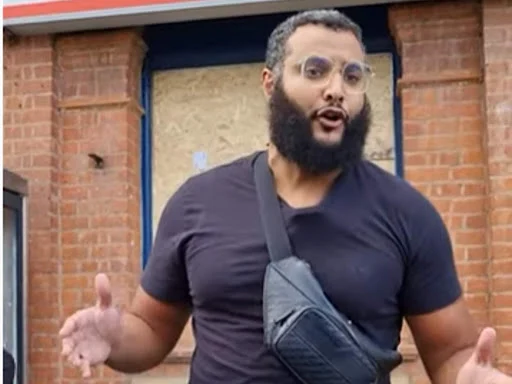By Lilo Phedra
Let me say this upfront — this is not a personal attack. This is not an emotional rant. This is a call for honesty, accountability, and consistency. Especially when it comes to public figures like Mohamed Hijab.
For years, this man has been active online—on Twitter, YouTube, public debates—saying and doing things that, frankly, most people would’ve been cancelled for a long time ago. But somehow, he keeps getting a pass. Why?
His Tweets Alone Should’ve Been Enough
Let’s not pretend we don’t know what I’m talking about. You’ve seen the tweets. He’s tweeted vulgar, sexually explicit insults about people’s wives, mothers, and families—especially aimed at Christians and ex-Muslims.
> "Tell your wife to stop messaging me"
"Your mother too"
(These are not jokes. They were public tweets that went viral and shocked many.)
If any Christian public figure had said something like that about Muslims or their families? Game over. They’d be called hateful, Islamophobic, reported, probably de-platformed. And maybe rightly so — because there should be consequences for that kind of behavior.
So why not him?
He’s Not Debating — He’s Bulldozing
If you’ve watched his debates (and trust me, I’ve watched more than enough), you’ll notice a pattern:
Interrupting constantly
Shouting down his opponents
Throwing in jokes and insults instead of actual counterarguments
This is not how respectful religious dialogue is done. Whether he’s debating David Wood, Apostate Prophet, or anyone else, his tone is aggressive, not persuasive.
You can disagree all you want with Christianity, ex-Muslims, or atheists — that’s your right. But dragging people’s families into the conversation? That’s not debating. That’s straight up bullying.
The Irony of "Free Speech"
Now, here’s the irony. Hijab always shouts "freedom of speech" when he wants to say something controversial. But when someone questions the Quran or talks about what it says about non-Muslims, suddenly they’re “Islamophobic,” “disrespectful,” or “provoking violence.”
So let me get this straight: He can say whatever he wants — no matter how vulgar — but when someone disagrees with Islam publicly, they must stay silent or risk backlash?
No. That’s not free speech. That’s selective freedom. And it’s very clear.
Why Hasn’t He Been Banned or Arrested?
This part confuses many of us. Hijab doesn’t live in a strict Muslim country — clearly. Because if he did, I don’t think he’d dare say or did half of the things he says and do online.
And yet, he's not banned from platforms like X (Twitter), YouTube, or even demonetized like others have been for far less. Why? Is it because of his popularity? Or fear of being accused of Islamophobia?
If a Christian influencer made constant threats, insults, and religious mockery at this level, they’d be all over the news, probably doxxed, maybe even arrested in some places. But for Hijab? Silence.🤐
That’s not justice. That’s selective outrage.
Real People Have Called This Out — Even Muslims
This isn’t just me talking. Plenty of people — including ex-Muslims, Christian apologists, and even some concerned Muslim viewers — have spoken up:
David Wood: “Hijab lost the debate the moment he brought up my wife. That’s not apologetics.”
Apostate Prophet: “Hijab is obsessed with intimidation, not truth. His threats aren’t even hidden.”
Random ex-Muslim on Reddit: “I left Islam in part because of how aggressive people like Hijab were. It didn’t feel like peace — it felt like control.”
So What Is His Real Agenda?
Many of us genuinely wonder: If he’s happy in non-Muslim countries, why does he still carry so much anger toward non-Muslims?
Some say, “Oh, he’s just defending Islam.” But if your method of defense involves insults, threats, and bragging about Shari’a law in secular countries — is that really defense or is it a soft push for something else?
And if the Quran does say problematic things about how to treat non-Muslims (and yes, there are verses that raise eyebrows), is it wrong to ask questions about that?
Final Thoughts: Enough Is Enough
This blog is not about hate. It’s about calling out double standards. It’s about asking: why are some people allowed to break the rules while others get cancelled for having respectful conversations?
If Mohamed Hijab wants to be a public figure, a voice for Islam, then he needs to act like one. That means apologizing for vulgar posts. That means respecting his debate opponents. That means accepting that criticism is part of public life — even if it’s about Islam.
Because if we’re going to talk about peace, respect, and truth, then those values must be shown, not just preached.
💬 Got a Story? Drop it in the Comments.
Whether you’re Muslim, Christian, atheist, or just curious, I invite you to share your thoughts — respectfully. Let’s have a real conversation. No threats. No insults. Just truth.
Disclaimer: Images used on this blog are for illustrative purposes only and remain the property of their respective owners. No copyright infringement is intended.







No comments:
Post a Comment